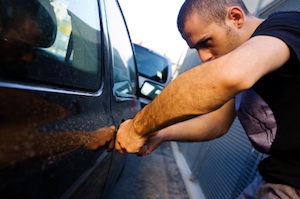"Beware of Cloned Cars"
That's the message from Caroline Curneen, PR and Marketing Manager at the European Consumer Centre Ireland.
The ECC has said that the threat of cloned cars being sold in Ireland was significantly increased following the theft in 2006 of blank registration documents from the UK Driver and Vehicle Licensing Agency (DVLA) in Swansea. A recent investigation by the BBC showed that vehicles worth £13m have been stolen as a result of the loss of thousands of blank DVLA log books.
Just how many cloned cars have made it onto Irish roads is unclear but possession of blank registration documents has allowed fraudsters to copy the genuine vehicles log book which makes the cloning much more difficult to detect.
Buyer Beware!
A recent TV programme looks at the problem of cloned vehicles on Irish roads.
According to Caroline Curneen, PR and Marketing Manager of ECC Ireland,
"This is a scam which may affect Irish consumers as they increasingly are choosing to shop cross border for larger items such as cars with many consumers discovering that it is often cheaper to buy a car in the UK and register it in Ireland.
A consumer may only discover that they have purchased a cloned car when they are issued a parking fine or speeding ticket. If you buy a stolen car, you risk losing the vehicle and your money even though you bought the car in good faith so it is imperative that consumers carry out comprehensive checks on any vehicle before purchase".
You can perform an instant check on any vehicle registered on Irish, Northern Irish or UK roads by entering its registration number in the box now:
[motorcheckform]
Motorcheck automatically includes the UK history with every imported vehicle so you don't have to be concerned with finding its previous registration numbers.
Top Tips for Identifying Cloned Cars
The following tips have been complied by the ECC and will assist you in determining whether or not the car you're looking at could be a clone.
- There are three main ways to spot a clone – check the log book, inspect the car and identify the VIN (vehicle identity number).
- Check the vehicle registration document (V5C). Buyers should not proceed with the sale until this document has been produced and they have examined it carefully. Look out for any obvious spelling mistakes. The registration document should have a watermark, the number plate should be clearly listed, the VIN and engine numbers matching those of the car should be listed as should the name and address of the seller. There should be no spelling mistakes or alterations. You can check the validity of the logbook by calling the DVLA.
- Check the VIN (Vehicle Identification Number) plates for signs of tampering. A VIN is a car’s unique identity number. They are usually located in several places, under the bonnet, under the driver’s seat and on the chassis.

Car Thief Some cars have the VIN etched into the glass on a window or sunroof so check to see if there are signs that the VIN number has been scratched off or that stickers are not concealing a VIN number. Make sure that all plates have the same number and look for signs that it may have been removed. When you decide what make and model you are interested in, find out where the vehicle identification number (VIN) is on that vehicle. You will then know where to look and check it’s correct.
- Check that numbers listed on the registration document match the car’s number plate, engine number and VIN. Be certain that the V5 certificate is genuine and hasn't been changed in any way.
- Be on the lookout for stolen registration certificates. The DVLA has provided a range of serial numbers of known stolen registration certificates on their website. If you find one that is in the range of BG8229501 to BG9999030 or BI2305501 to BI2800000 do not proceed with the sale and contact the police.
- Carry out a vehicle check with a vehicle data-check company. This won’t be able to identify a cloned car, but it will tell you if a vehicle has been recorded stolen, written off, scrapped or has outstanding finance.
